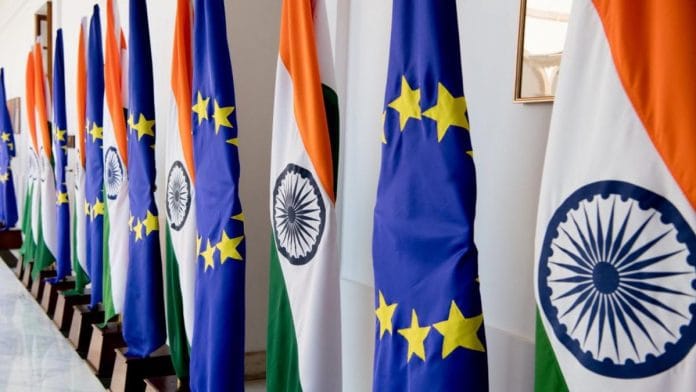New Delhi: The Economic Survey 2024-25 has noted that new environmental regulations of the European Union (EU) would hobble trade with India, calling out the bloc’s “double standards” in its need to impose climate protection rules on developing economies.
The document published Friday said countries like India faced the “twin challenge” of achieving higher levels of economic development and dealing with climate change mitigation and adaptation. “Therefore, the international community must find a balance that supports both environmental sustainability and the economic development needs of developing economies and LDCs (least developed countries).”
The survey delivered a scathing retort to the EU’s upcoming deforestation rule (EUDR), saying: “European agriculture could not have come up without deforestation, and the imposition of EUDR reeks of double standards.”
The EUDR comes into play at the end of 2025 while its Carbon Border Adjustment Mechanism (CBAM) will be effective from 1 January 2026.
Both have been a sticking point in ties with New Delhi, as the two sides negotiate a free trade agreement (FTA) for the last two years. While EU Ambassador to India, Herve Delphin, once told ThePrint there was “political will on both sides” for an FTA, things have slowed down in recent months.
Also Read: India-EU FTA can help balance against economic power of US & China, says Portuguese foreign minister
CBAM will hit iron & steel, cement, fertilisers
The CBAM will impact exports from “third” countries – as EU calls those outside the bloc –- in the carbon-intensive sectors of iron and steel, aluminum, cement and fertilisers.
Union Minister for Commerce and Industry Piyush Goyal has warned of the CBAM’s fallout on Indian exports amid negotiations for the coveted free trade agreement between the 27-member bloc and India.
The CBAM looks at direct emissions from the production processes of these goods in “third” countries, and requires European importers to buy carbon certificates corresponding to the carbon price paid by the domestic manufacturers in those countries.
The new restrictions are viewed as a carbon-price equivalence measure, which would prevent European consumption to be imported from third countries with softer environment regulations.
In 2023, India’s export of iron and steel to the EU was $5.57 billion. Its export of aluminum stood at $1.8 billion, while the export of cement and fertilisers was roughly $10 million.
EUDR says products must be deforestation-free
Similarly, the deforestation rules (EUDR) aim to regulate consumption of products which are manufactured in deforested lands in “third” countries. The EUDR is set to take effect at the end of 2025, while for some smaller businesses it will come into effect in 2026.
“It requires the operators and traders to ensure that the products placed in the EU market are (i) deforestation-free (i.e. must not be derived from a land which is deforested after December 31 2020); (ii) should be produced by the relevant legislation of the country where the product is produced; and (iii) covers the submission of a due diligence statement, including supply chain integrity through an elaborate trace and track system before placing the products in the EU,” noted the Economic Survey.
Products such as soy, beef, palm oil, wood, cocoa, coffee, rubber and their derived products would be affected by the EUDR.
“The costs of complying with the regulation include information requirements, risk assessment, risk mitigation and reporting obligations. These costs are not border measures but affect the competitiveness of a country’s exports vis-a-vis other countries’ compliance costs. Therefore, the Regulation would change the trade costs (increase) for the EU’s trading partners in specific commodities,” the survey said.
Also read: As von der Leyen talks of diversifying supply lines, EU envoy says ties with India to be priority
Trade protection masquerading as climate concern: ES
The EU has in recent years become one of the top export destinations for India, accounting for roughly $73.64 billion, according to the Economic Survey. The CBAM and EUDR rules are likely to impact roughly 13 percent of that total — which is equivalent to about $9.5 billion.
The document noted the share of CBAM exports in total Indian exports to the EU had increased substantially from 6.3 percent in 2014 to 10.5 percent in 2023.
“In short, it is hard to shake off the conclusion that both CBAM and EUDR are trade protection measures garbed in the language of climate and environment. The game and the end goals are the same, but the tactics keep changing. Labour standards, gender, democracy, emissions and deforestation, the innovative list will keep evolving with time,” the survey said.
Goyal recently met Maroš Šefčovič, the EU commissioner for trade and economic security during a visit to Brussels on 18 and 19 January, where the FTA and the larger trade agenda were discussed.
The EU Commission President, Ursula von der Leyen, during a speech at the World Economic Forum in Davos on 21 January announced that her first visit during her second presidency would be to India – indicating the EU’s seriousness in expanding ties.
However, despite the “clear political will”, the CBAM and EUDR are regulations which have proven to be an irritant to ties. In October 2024, Goyal said that progress on the FTA had been “marginal” between India and the EU.
The Indian commerce minister also said the EU’s new environmental regulations disrespected the Paris Agreement of 2016, where the world came together to accept the principle of common but differentiated responsibilities.
Goyal is not the only minister to take aim at CBAM. Earlier that month, Finance Minister Nirmala Sitharaman hit out at the new environmental regulations, saying they would hurt India’s exports.
(Edited by Tikli Basu)
Also Read: As India grapples with EU carbon tax, renewables could help cut heavy industries’ emissions quickly






